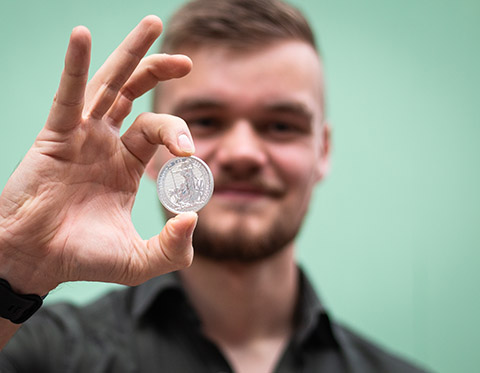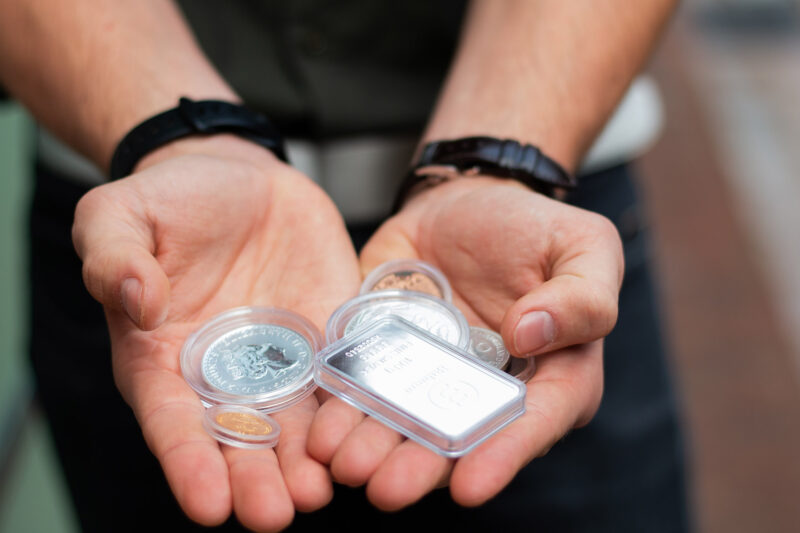
Even students can invest
Whatever you do, just don’t panic
When Sasha Westra (22) was introduced to Excel during his first year of business studies, he was sold. He started keeping track of his accounts and made spreadsheets to compare stocks and currencies.
So when he had some extra cash, thanks to two marketing companies he’d set up and side jobs as a team leader at Albert Heijn and head teacher at a tutoring agency, it was only logical for him to invest it. ‘I didn’t want to just have it languish in a savings account or spend it on useless stuff.’
He started making some small investments here and there, but the hobby quickly grew. ‘My spreadsheets also became increasingly complicated’, he says. These days, Sasha invests in investment funds, real estate, and watches, among other things. ‘It went from just trying it out to seriously working out how to best distribute my money.’
This isn’t something that will only benefit him later in life: ‘One of my hobbies has always been ancient coins’, he says. ‘Now I can actually afford that.’
Interest on interest
Sasha is far from the only one who started investing money at a young age. A report by national institute on budget information Nibud and the Rabobank showed that last year, 41 percent of students were investing their money, as opposed to just 20 percent of the general Dutch population. The main reason students invest is to accrue capital, but approximately 56 percent does it as a hobby. They enjoy the excitement or feel it’s a fun way to handle money.
You have to switch off your own instincts
‘There’s nothing wrong with accruing capital at a young age’, says Roelof Salomons, professor of investment theory and asset management. ‘You just have to find a way to switch off your own instincts, to avoid panicking at the wrong time.’
According to him, it’s especially important that students know the value of compound interest. ‘Investing is a long game. If you invest a little bit of money every month and leave it be, it will eventually start working for you.’ This leads to a kind of snowball effect, with your investments growing exponentially.
Solar park
Four years ago, physics student Thomas Dam (22) invested his money in bonds with a fourteen-year term. ‘They were building a solar park near my parents’ house, and it needed crowdfunding’, he says. His father said it would be a good idea for him to invest. Every year, he receives a small repayment with interest which depends on the price of electricity. ‘That means the current high price is very good for me.’
Since then, he’s invested in other solar parks. He always uses the same company but varies the terms and types of repayment. ‘I’m trying to spread the risk a little.’ But he doesn’t spend a lot of time on his investments. ‘I just put some money into it every once in a while and then forget about it.’
Thomas is cautious about investing. ‘I don’t invest more than what I borrow with DUO’, he says. ‘Right now, I’m 500 euros off-balance, but I’m alright with that.’ Two years ago, a friend convinced him to buy crypto coins. ‘I spent around 200 euros, but the value dropped like a stone after that. I don’t think crypto’s worth it.’
Crypto
Many students are of a different opinion: approximately 27 percent of students invested in crypto last year. ‘The way I see it, that has nothing to do with actual investing’, Salomons says. Crypto is mainly focused on making a quick buck. ‘Investments like those are driven by psychology and hype rather than economic rules’, he says.
The current high energy prices are very good for me
Using your student loans as investment capital, like Thomas is doing, is also risky, says Salomons. ‘If you’re using borrowed money to invest, you should never borrow more than you can afford to lose’, he explains. ‘You still have to meet all your responsibilities.’ After all, a debt will always stand, even if investments depreciate.
Theoretically, young people can afford to be a bit more risky than older people, since they still have their whole lives to make money. ‘But if you invest at the wrong moment and lose your money and then get unexpected bills. you’re in trouble.’
Lower
Until recently, student loan interest was at 0 percent, which made it seem like an easy way to make money. ‘Last year, you’d be nuts if you got less than a 0-percent return’, says Salomons. ‘But this year, stocks are 18 or 19 percent in the red. Even relatively safe government bonds are 15 percent lower.’
Sasha tries not to get too worked up about the fluctuations. ‘Sure, it sucks if something depreciates’, he says. ‘But nine out of ten times, it’ll end up appreciating again in the long term. The stock market is a big mess.’
The stock market is a big mess
Nevertheless, he doesn’t take risks he can’t afford. ‘My grandpa used to say: “Only invest money you can lose.” Obviously, I’d prefer not to lose any money at all.’
Movement sciences student Tom van Heuvel (21) has noticed that people have a lot to say about investing. His parents thought it was a great idea, but some of his friends told him he’s crazy. ‘Everyone has an opinion on the matter’, he says. ‘When I bring it up, everyone has their two cents. In the end, it’s my money. I can do whatever I want with it.’
He picks his own companies, like ING, and adds shares to his portfolio. ‘I just leave it there, instead of letting it depreciate in a savings account that only has 1 percent interest.’
Rational
According to Salomons, the biggest danger investors face is that in the end, we’re only human. ‘We kind of get in our own way. We think we’re being really rational, but our irrationality often leads us to do the wrong thing at the wrong time’, he says. People either trade too much or try to make up for lost money. ‘Fortunately, computers are much better at those kinds of things.’
He once again emphasises the advantages of long-term, passive investments. The best option is an investment fund or outsource it to an investment expert. ‘If that’s what you mean by investing, students can do it too.’
